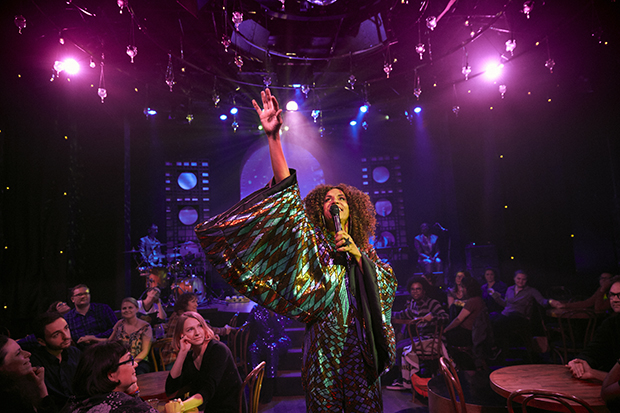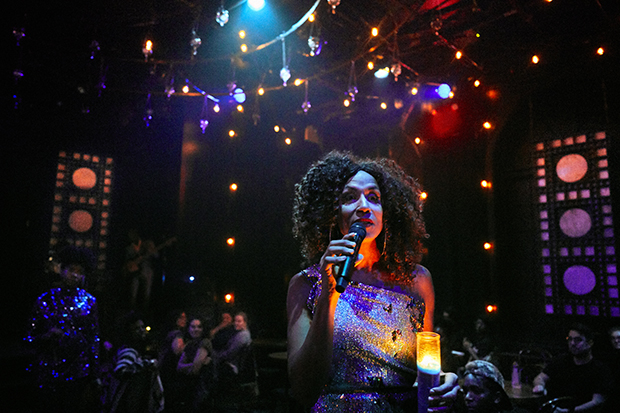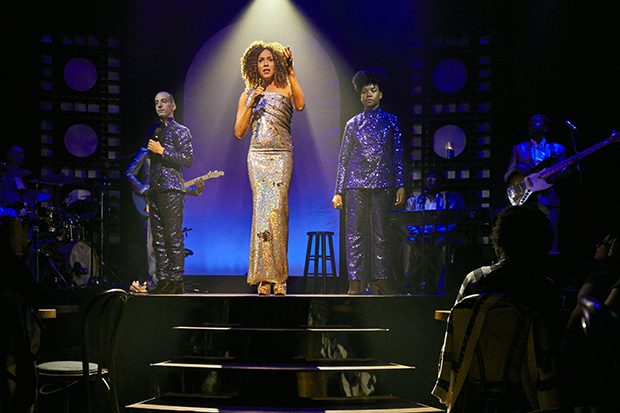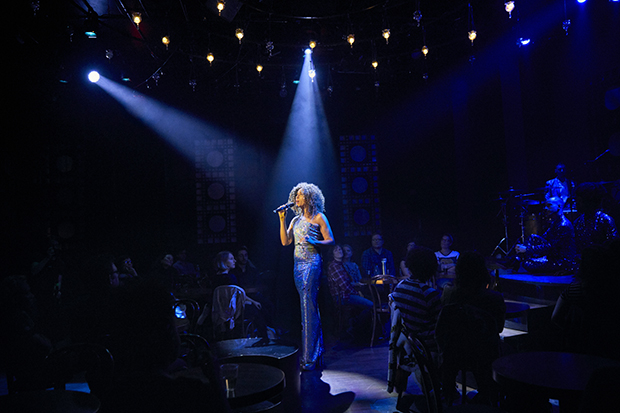Daniel Alexander Jones on Seeing Through the Darkness in Black Light
Jomama Jones returns with her cabaret revival for turbulent times.

(© Chad Batka)
Daniel Alexander Jones is not as famous as his drag persona, the legendary soulsonic superstar Jomama Jones. Yes, it is Daniel up there in the wig and reversible sequined body suit, but he speaks of Jomama as entirely distinct, as if he is merely the vessel through which this divine being manifests her earthly presence.
Audiences at Joe's Pub certainly felt those supernatural vibrations when Black Light, Jomama's latest concert, played the Public's cabaret space earlier this year. The show has now returned for a limited engagement (until December 31) at the Greenwich House Theater, right before it becomes the downtown home of Ars Nova.
Full of ritual, song, and story, Black Light exists in the borderlands between cabaret and religious revival. In the following interview, Daniel Alexander Jones speaks about what drives his work, how Jomama Jones recused him, and how she might just recuse America.

(© Chad Batka)
You open the show by asking the audience a series of hypothetical questions: What if I told you it's going to be all right? What if I told you, not yet? What if I told you that we will we won't all make it through? What are you talking about?
Daniel Alexander Jones: I'm talking about making it through this particular juncture of our country's history. There are actual material consequences to this time and to the choices that we make. One of those consequences is that not everybody will live through it. There's certainly the natural process of death and dying, but I'm speaking very particularly about what it means to survive a time of such upheaval.
You started performing as Jomama Jones in the '90s, but didn't really return to her until 2008. Why was that?
In 2008 I was 38 and going through a breakup. I was hitting a wall in my career as an artist that was very difficult to move beyond. And a lot of that had to do with the fact that I am an interdisciplinary artist, which is a difficult thing to maintain because people like their categories. Everyone was saying there's not really a path forward for the work I wanted to do. Jo[mama] came back to me not as a conscious decision, but almost as a visitation. And she was like, "What are you doing? This is the time to give me the reins." I resisted at first, because I don't like going backwards as an artist. But what was clear was that the voice I heard was a voice that had also been transformed over time into a more grounded presence. By giving over to what she wanted to do, she's led me into some extraordinary experiences.
It's a decade later and now America feels like it's going through a similar existential crisis. Has Jomama Jones returned to guide us through the crossroads?
I've thought of her very much as a high priestess of the crossroads. I think she is appearing less to give answers, but more to bring the questions into starker relief, and hopefully make a space where we can sit with one another in real time. I don't know anyone who is not feeling the weight of this moment we're in, one way or another.
Why is the show called Black Light?
It has a number of meanings: One is the idea that there is a part of the spectrum that can illuminate things that were otherwise invisible. I also think about Black Light in terms of blackness culturally, and the way in which it emits light that is often born of very challenging experiences. I look at the ways in which the music, the storytelling, the movement, and the spiritual experience of gathering together — all of those things have gotten black folks through in the US. And I think there are tremendous lessons to be gleaned for people who are not part of that background, because a lot of the things that people are shocked by in the news these days…black folks have always known about. And maybe by paying attention to the way that we've gotten through, there may be some lessons there for the rest of the country.

(© Chad Batka)
I am fascinated by your backup singers, the Vibrations. They seem like altar boys from outer space. Is that what you were going for?
I think that is the best description I've ever heard. I woke up in the middle of the night and I thought, "Oh, they're the vibrations!" They are extensions of Jomama's energy as much as they are themselves. They are meant to amplify all of the thoughts and the sounds and the feelings in the room.
In very distinct ways.
I never want anybody to be like a cog in a wheel onstage. So I'm always interested in the personalities of the individual coming through. That comes out of my love for LaBelle, right? You have Patti LaBelle, Nona Hendryx, and Sarah Dash. They couldn't be more different from one another and I think that made the sound better. It was more complicated and chewier. I like that better than uniformity.

(© Chad Batka)
A character in one of Jomama's stories talks about staring into the darkness, and things revealing themselves as her eyes adjust. As your eyes have adjusted to the darkness of the last couple of years, what have you seen?
A couple of things: The first thing I've seen, and I would include myself in this behavior, is the depths to which comfort has impeded our capacity to be brave. The other thing that I've seen is how incredibly powerful and clear the upcoming generation is. I'm thinking of the Parkland generation, specifically. They are not willing to play the game the same way anymore. And so I'm heartened, but I'm not naive about what stands between that willingness to engage these challenges and a positive outcome. The last chapter hasn't been written yet, and we have a lot to do.







